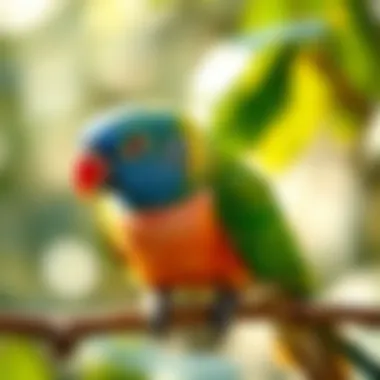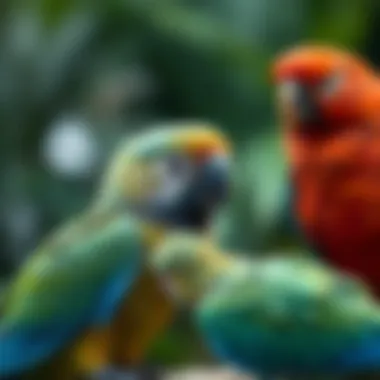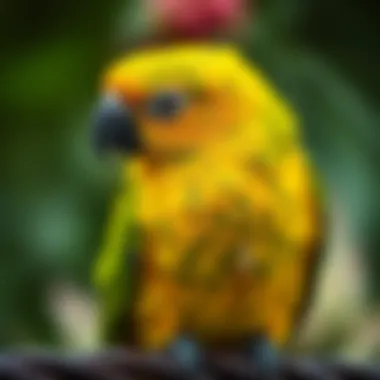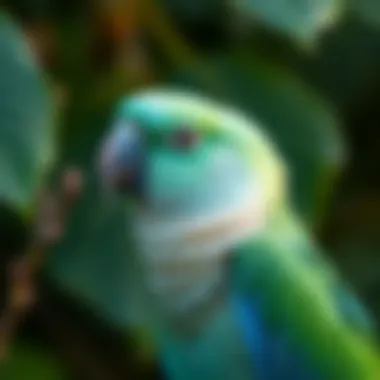NutriBerries: Essential Nutrition for Parrots


Intro
Parrots have captivated humans for centuries with their vibrant colors and remarkable ability to mimic sounds. As pet owners, it’s essential to understand not just their captivating behaviors, but also the nutritional needs that support their lively spirits. Among various dietary options available in the market, NutriBerries stand out as a notable choice. These delightful snacks promise to provide essential nutrients while keeping your feathered friends engaged. In this guide, we will take a closer look at the role NutriBerries play in a parrot's diet, their nutritional composition, and how they fit into an overall healthy lifestyle for your pet.
Making sure our avian companions are well-fed and healthy can sometimes feel as tricky as teaching them to talk. As we dive deeper into the nutritional significance of NutriBerries, we’ll explore the best practices for incorporating them into your parrot's diet, highlighting benefits, potential concerns, and even some alternatives if you wish to mix things up.
By the time we reach the end, you should have a well-rounded understanding of how these berry-shaped morsels contribute to your pet's well-being, ensuring that your beloved parrot remains energetic, happy, and thriving. Let's get started with understanding our feathered friends more closely.
Prologue to Parrot Nutrition
Understanding the nutritional requirements of parrots is a cornerstone for ensuring their overall well-being. Parrots are incredibly intelligent and social creatures; thus, their dietary needs can be both complex and specific. In this section, we dive into the foundational aspects of avian nutrition, touching upon elements that play a vital role in the life of these vibrant companions. A well-informed pet owner will not only enhance their parrot's quality of life but will also foster a stronger bond through proper care.
Understanding Avian Dietary Needs
Each species of parrot has unique dietary requirements shaped by their natural habitats and behaviors. Generally, parrots are omnivorous, meaning they thrive on a combination of seeds, nuts, fruits, and vegetables. However, an adequate diet goes beyond just tossing a handful of seeds into their cage. For instance, African Grey parrots might need higher levels of calcium and vitamin A compared to Budgerigars.
A diverse diet is crucial; think of it like a colorful canvas – the more colors you add, the more vibrant it becomes. By offering different food types, owners can prevent malnutrition and promote better health. Foods like carrots and spinach provide essential vitamins, while seeds and nuts are a great source of energy.
"The variety in your parrot's diet is like seasoning in a meal; without it, everything feels bland."
Owners should be on the lookout for signs of nutritional deficiencies. Common indicators include feather plucking or lethargy, which often signal that something might be amiss in their diet. To ensure that your feathered friend is eating well, consider introducing foods gradually, allowing them to explore and familiarize themselves.
The Role of A Balanced Diet
In the same vein, every parrot needs a balanced diet to thrive, which encompasses the right amounts of protein, fats, and carbohydrates. Each component has a specific role, akin to the parts in a well-tuned machine. Proteins contribute to cellular functions and muscle growth, fats are essential for energy, and carbohydrates should come from whole foods to support digestion.
- Proteins: These help in the development and repair of body tissues. Common sources include legumes, whole grains, and lean meats.
- Fats: Found in seeds, nuts, and oils, fats are key for energy and nutrient absorption. However, moderation is vital to prevent obesity.
- Carbohydrates: These should primarily come from fibers, like fruits and vegetables. They aid in digestion and help maintain gut health.
Incorporating these food groups into a parrot's diet isn’t just beneficial; it is essential. A balanced diet enhances overall health, improves feather quality, boosts energy, and strengthens the immune system. In essence, a healthy parrot is a happy parrot. Thus, it falls on the shoulders of the owner to provide the right mix of foods to keep their avian companions thriving.
Overview of NutriBerries
NutriBerries are more than just a treat for parrots; they represent a crucial component in achieving optimum avian nutrition. In the bustling world of pet care, where choices abound, understanding what NutriBerries are, their ingredients, and how they are produced is key for every parrot enthusiast. This section aims to illuminate the significance of NutriBerries, ensuring owners can make informed decisions about incorporating them into their feathered companions’ diets.
What are NutriBerries?
NutriBerries are a unique product made specifically for parrots and other birds. Unlike traditional pellets or seeds, these are shaped like small balls, combining essential vitamins, minerals, and other nutrients. Their distinctive shape and texture mimic the natural feeding behaviors of birds, leading to more engaged and happy pets. Birds need variety in their diets, and NutriBerries provide that in an enticing way, encouraging them to forage and explore, much like they would in the wild.
Ingredients and Nutritional Profile
The nutritional profile of NutriBerries is tailored to meet the diverse dietary needs of parrots. These small but mighty nuggets typically include a mixture of seeds, grains, fruits, and added vitamins. Notable ingredients often found in NutriBerries include:
- Millet seeds – providing energy and essential fatty acids.
- Corn – a source of carbohydrates and fiber.
- Dried fruits (like apples and blueberries) – packed with antioxidants and minerals.
- Fortified vitamins and minerals – supporting overall health and vitality.


When examining the Nutritional profile, a closer look at the label can show a fine balance of protein, fat, and fiber, which ensures parrots are getting a well-rounded diet. The overall nutritional arrangement can be a game-changer, particularly for those feathered friends with picky eating habits.
Production Process
The journey of NutriBerries from the factory to your pet's bowl is something to appreciate. The production process often involves combining all the ingredients in specific ratios, followed by pressing them into berry shapes. After being formed, these bites undergo a gentle heating process, ensuring that the nutrients remain intact while extending shelf life.
One might think that freshness is sacrificed during this production; however, quality control is taken seriously. Only high-quality ingredients are utilized, ensuring consistency and safety. Furthermore, with clear labeling, pet owners can rest easy knowing exactly what they’re feeding their birds.
“A great diet isn’t just about what you’re feeding, it’s about what your pet is enjoying as well.”
In summary, NutriBerries are not merely a snack for your parrot; they ensure a balanced and nourishing dietary approach suitable for a variety of avian friends. This guide seeks to help pet owners recognize the value these unique products bring to their avian family members.
Health Benefits of NutriBerries for Parrots
When examining the dietary choices for parrots, it becomes crucial to focus on the specific health benefits that NutriBerries provide. It's no secret that having a nutrient-rich diet fortifies the overall well-being of our feathered companions. NutriBerries are not just simple treats; they pack a punch when it comes to nutrition and health support. In this section, we will delve into three primary facets of NutriBerries: the essential nutrients they offer, their role in promoting digestive health, and their impact on the immune system.
Essential Nutrients in NutriBerries
NutriBerries are formulated with a selection of wholesome ingredients designed to offer a broad spectrum of essential nutrients. These tiny powerhouses are typically enriched with vitamins, minerals, fats, and proteins critical for avian health. Parrots require a variety of nutrients for their optimal growth and longevity.
- Vitamins: They often contain Vitamin A, which is vital for good vision and skin health. Vitamin D3 is also present, playing a crucial role in calcium absorption.
- Minerals: Key minerals, such as calcium and phosphorus, support bone structure and function.
- Fiber: The feeding formula includes beneficial fibers that improve digestion and help maintain a healthy weight.
The carefully balanced composition of NutriBerries offers a comprehensive nutritional foundation, addressing the distinct needs of parrots, ensuring they stay healthy and vibrant.
Supporting Digestive Health
Digestive health is paramount for any pet, and parrots are no exception. NutriBerries contribute positively to a parrot's digestive system in several ways. They contain high fiber content, which is essential for effective digestion.
"A healthy gut leads to a happy bird."
The fiber present helps in maintaining a smooth digestive process that can prevent issues like constipation and vomiting, common signs of dietary distress. Furthermore, specific ingredients in NutriBerries are chosen to foster a balanced gut microbiome, ultimately leading to an improved nutrient absorption rate. When parrots enjoy NutriBerries, they often exhibit better digestion and increased energy levels.
Boosting Immune Function
A robust immune system is the backbone of a parrot's health. NutriBerries are crafted to bolster this system by incorporating antioxidants, vitamins, and nutrients known for their immunomodulatory properties.
- Antioxidants: They combat free radicals in the body, reducing oxidative stress. This is where Vitamin E plays a starring role.
- Beta Carotene: Found in the formula, it transforms into Vitamin A, supporting immune function and overall health.
- Fluids: Parrots that consume NutriBerries may also become more hydrated, thanks to moisture-retaining ingredients.
These factors combined foster a bird's natural defenses against infections and diseases, promoting better overall health. By integrating NutriBerries into their diet, pet owners can be proactive in securing a parrot's immunity, contributing to a longer, healthier life for their avian companions.
Feeding Guides for Parrots
Feeding guides play a crucial role in ensuring that your parrot receives the appropriate nutrition. Every parrot has its own unique dietary needs based on factors like species, size, age, and activity level. Understanding these needs helps pet owners make informed decisions about what to feed their feathered friends. NutriBerries, with their specific ingredients and nutritional values, fit well into these guidelines, enhancing both health and quality of life for parrots.


How to Introduce NutriBerries
When bringing NutriBerries into your parrot's diet, it’s essential to take a gradual approach. Parrots can be creatures of habit, so sudden changes might cause them to be hesitant or refuse new foods altogether. Start by offering NutriBerries alongside their usual diet. You might sprinkle a few NutriBerries amongst their regular pellets and seeds. Doing so allows your parrot to explore the new texture and flavor without feeling overwhelmed.
Additionally, consider breaking the NutriBerries into smaller pieces at first. Many parrots enjoy foraging, so placing the pieces in different areas of their cage could encourage exploration. Sometimes you may need to shake the NutriBerries bag to catch their attention. Be patient—allow your parrot to discover the NutriBerries at their own pace, and do not force them to eat it. Little by little, they will get used to this new addition to their diet.
Recommended Serving Sizes
Determining the right serving size of NutriBerries involves a few factors, including the size and species of your parrot. Generally speaking, a good rule of thumb is to offer one to two NutriBerries per day for smaller birds like budgerigars, while larger parrots like African Greys may enjoy two to four. It’s also advisable to observe their overall diet and health.
Here’s a simple breakdown:
- Small Parrots (e.g., Budgies, Cockatiels): 1 - 2 NutriBerries per day
- Medium Parrots (e.g., Conures, Lovebirds): 2 - 3 NutriBerries per day
- Large Parrots (e.g., Amazons, Macaws): 3 - 4 NutriBerries per day
Always consider adjusting servings based on your parrot’s individual needs, age, and activity level. If they are particularly active, they might require a slightly larger serving, whereas less active parrots might need fewer. Monitoring their weight can also help guide your serving sizes.
Balancing with Other Foods
NutriBerries shouldn’t be the only component of your parrot's diet but rather one piece of the intricate puzzle that is their nutritional intake. A balanced diet for parrots also includes a variety of fruits, vegetables, and high-quality pellets. Here are some ideas for balancing NutriBerries with other essential food types:
- Fresh Fruits: Apples, bananas, and berries can make delightful treats alongside NutriBerries.
- Vegetables: Leafy greens such as kale or spinach are packed with nutrients and should be included regularly.
- Pellets: High-quality pellets can provide crucial nutrients that NutriBerries may not fully cover.
Make an effort to introduce a rainbow of foods, ensuring no food group is neglected. Experimenting with different combinations can keep your parrot engaged at mealtime while allowing them to enjoy a wide array of flavors and textures. Remember, a well-rounded diet leads to a happier and healthier parrot.
Potential Concerns and Considerations
When it comes to feeding NutriBerries to parrots, it’s crucial to understand potential concerns and considerations surrounding their incorporation into your pet's diet. While NutriBerries provide essential nutrients, not all parrots respond the same way to them. Being well-informed helps ensure that your feathered friend thrives.
Allergies and Sensitivities
Just like humans, parrots can experience allergies and sensitivities to certain ingredients. For some birds, NutriBerries may trigger reactions due to specific components such as nuts, seeds, or added vitamins.
- Watch for Symptoms: Keep an eye out for indications like itching, feather plucking, or unusual droppings. These may suggest a reaction to ingredients.
- Trial and Error: If you suspect an allergy, consider introducing NutriBerries gradually. Start with a small amount and observe your parrot's health. If issues arise, halt the feeding and consult a vet.
"Being vigilant and understanding your parrot's unique needs can help prevent discomfort and health issues."
Overfeeding Risks
Overindulgence can be a slippery slope. Though NutriBerries are formulated to be nutritious, they can also be high in calories. Too many NutriBerries could lead to obesity and other related health issues.
- Portion Control: Establish a balanced diet by sticking to recommended serving sizes. Small pets can easily gain weight if given too many calorie-dense foods, making moderation key.
- Monitor Weight: Regular weigh-ins can help in assessing if your parrot is maintaining a healthy weight. If any changes occur, adjust their diet accordingly.
Choosing Quality Products


Not all NutriBerries are created equal. With a variety of brands on the market, it’s essential to select high-quality options. Look closely at the ingredient list and nutritional information to ensure you're making the right choice.
- Ingredient Transparency: Choose products where the ingredients are clearly listed. Avoid those with ambiguous terms or additives that you can't identify.
- Research Brands: Read reviews and check for certifications. Reputable brands often invest in research or are recommended by veterinary professionals. This can provide peace of mind in making the right selection for your parrot.
In sum, while NutriBerries can be a great addition to your parrot's diet, being aware of allergies, managing portion sizes, and selecting quality products are all crucial considerations to promote your feathered friend's well-being. Keeping these factors in mind ensures that you provide the best care and support for your parrot's nutritional needs.
Exploring Alternatives to NutriBerries
Just like humans, parrots thrive on variety. While NutriBerries can be a fantastic part of their diet, it's equally important to consider alternatives that can contribute to a balanced nutritional plan. Understanding these alternatives allows pet owners to ensure their feathered friends are not only happy but also nourished in ways that cover a broad spectrum of dietary needs.
Other Pellet Options
Pellets are a common staple in avian diets, designed to provide balanced nutrition that mimics the natural diet of wild parrots. However, not all pellets are created equal. Choosing high-quality pellets is critical. Each brand has its unique formulation, so it's wise to read labels carefully.
Some reputable pellet brands include
- Harrison's: Known for its organic ingredients and strict manufacturing standards.
- Sunseed: Offers various formulations tailored to specific parrot species.
- Zupreem: Provides an array of options enriched with essential vitamins and minerals.
These pellets often come in various shapes and flavors, which can help keep your parrot engaged and interested in their food. Yet, even with pellets, it’s essential to incorporate other food types to avoid monotony.
Fresh Fruits and Vegetables
Fresh produce brings essential vitamins and hydration that might not be fully captured in processed foods. Fruits and veggies should make up a significant part of a parrot's diet. Some suitable options include:
- Carrots: Rich in beta-carotene, good for eyesight.
- Blueberries: Packed with antioxidants, they serve as a delicious treat.
- Spinach: A great source of vitamins A and C, but offering it in moderation is crucial due to its oxalate content.
Make sure to wash all produce thoroughly to eliminate any pesticide residue. Chopping vegetables into bite-sized pieces can make them more enticing for your pet. Introducing new fruits and veggies slowly can prevent any digestive upset.
Homemade Nutritional Solutions
Crafting homemade meals for your parrot can be not only rewarding but also highly nutritious. Homemade solutions allow owners to control the ingredients and tailor meals to their bird's specific taste preferences. Here are a few ideas:
- Cooked grains like quinoa or brown rice offer a healthy carbohydrate source.
- Nutritious smoothies made with fruits and a touch of yogurt can add excitement and hydration.
- Seed mix with dried fruits can provide texture and different flavors.
While preparing homemade meals, it’s essential to avoid any ingredients that are toxic to parrots, like chocolate, avocado, and certain types of nuts. Always ensure variety in the meals to make them appealing.
Variety is key for your parrots’ diet. A mix of pellets, fresh produce, and homemade meals keeps your bird engaged and healthy.
Ending
In wrapping up our exploration into the world of NutriBerries, it’s crucial to recognize their role as a cornerstone in the diet of parrots. This guide delves into various aspects of NutriBerries, illustrating how these nutrient-rich morsels play an essential part in ensuring the well-being of our feathered friends. For any bird owner, understanding the nutritional value of their pet's diet can not only enhance the longevity of their companion but greatly improve their quality of life.
Summing Up the Importance of NutriBerries
NutriBerries serve more than just as a treat; they act as a vital source of complex carbohydrates, proteins, and a meticulous blend of vitamins and minerals. These components cater to the unique dietary requirements of parrots, who thrive on variety rather than monotony in their meals. By incorporating NutriBerries, one can ensure that birds receive not only energy but essential nutrients that might otherwise be lacking in their diets. A balanced intake can help in maintaining healthy feathers, promoting a robust immune system, and fostering overall vitality. Moreover, the berry-shaped treats encourage natural foraging behaviors, which enrich the parrot’s environment, making mealtime an engaging experience.
Encouraging Informed Feeding Practices
A well-rounded diet is the foundation of a healthy life for your feathered companion.
In essence, NutriBerries represent a fantastic solution to achieving a nutritionally balanced diet. By choosing wisely, monitoring your parrot’s reactions, and embracing a holistic approach to bird care, you ensure not just survival but a thriving existence for these intelligent creatures.







